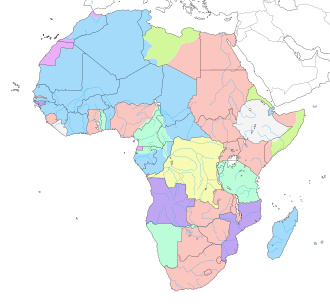Scramble for Africa
1880s–1900s Western European colonisation of Africa
The Scramble for Africa, also called the Partition of Africa or the Conquest of Africa, was the division, and colonization of most of Africa by seven Western European powers during a short period known to historians as the New Imperialism. The Berlin Conference of 1884, which regulated European colonization and trade in Africa, is usually referred to as the starting point of the Scramble for Africa.

| This article is a stub. You can help out with Wikiquote by expanding it! |
Quotes
edit- Every historical event is the result of a convergence of many contributing conditions. A different convergence might result in a different event which, influenced by all the remaining factors, would in turn lead to consequences different from those that in fact occurred and, thus, there would begin on an entire chain of events and phenomena -a different variant of development. The history of European imperialism can therefore be written only in a polycentric fashion. Whether we deal with white expansion in Africa, or with any other great instance of cultural diffusion on a continental scale, no unitary theory will ever untangle for us the richness and variety of the historical skein.
- Inculturation of Christian marriage in the Belgian Congo. 1919-1950. The Policy Making of the Mission Superiors on Polygamy; their directives to the missionaries and influence on the policy of the State. (Betty Eggermont) CHAPTER 3. THE COLONIZING GOVERNMENT. GANN (l.H.) en DUIGNAN (P.), Reflections on imperialism and the scramble for Africa. in GANN (L.H.) and DUIGNAN (Peter). Colonialism in Africa 1870-1960. Volume 1; The history and politics of colonialism 1870-1914. Cambridge, University Press, 1969, p.100-129.
- Europe is the light of the world, and the ark of knowledge: upon the welfare of Europe, hangs the destiny of the most remote and savage people.
- Inculturation of Christian marriage in the Belgian Congo. 1919-1950. The Policy Making of the Mission Superiors on Polygamy; their directives to the missionaries and influence on the policy of the State. (Betty Eggermont) CHAPTER 3. THE COLONIZING GOVERNMENT. This quote from the Edinburgh Review succinctly captures the superior compassion that lived in the nineteenth century, NEDERVEEN PIETERSE (J.), White over black. Images of Africa and blacks in Western popular culture., Amsterdam, Royal Tropical Institute, 1990, p.34.
See also
editExternal links
edit- Fischer, Hilke (25 February 2015). "130 years ago: carving up Africa in Berlin". Deutsche Welle. Retrieved on 6 June 2021.